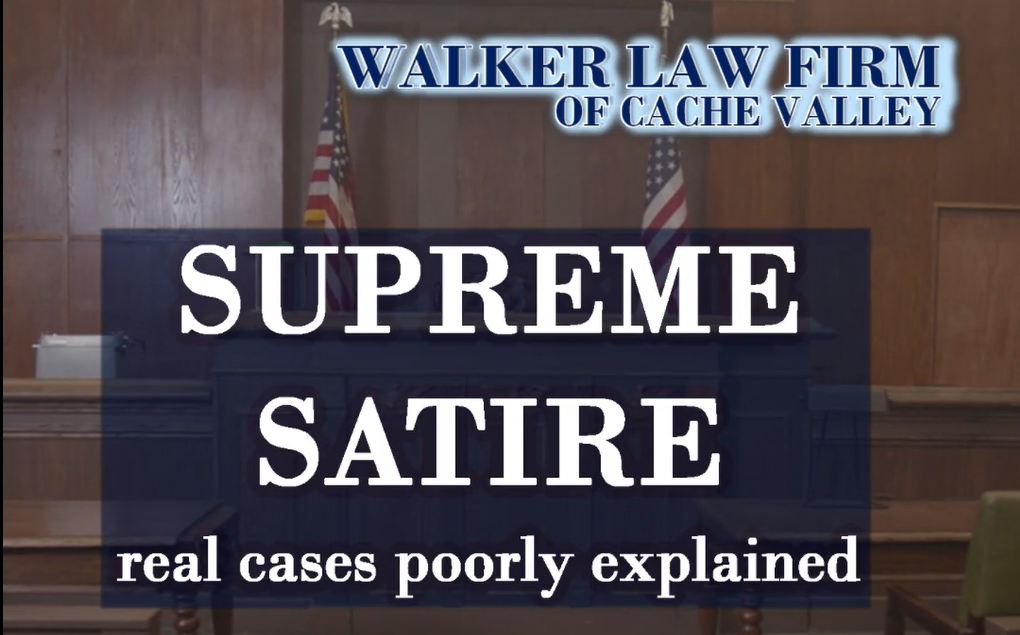Supreme Satire – Supreme Court of Utah Declares: Dirt Is Important, but Not That Important
Appellants at the Utah Supreme Court have once again gifted us with a ruling that proves what we all knew deep down: dirt is serious business. Forget oil, gas, or high-rise condos. Today’s true legal battlefield is the humble pile of sand, gravel, and clay. Yes, the very substance children fling at each other in sandboxes has now become the ammunition in a Supreme Court showdown in the case of Genesis Aggregates v. Toll Southwest, 2025 UT 28.
Let me set the scene. Imagine a tiny slice of land, just a quarter acre on Traverse Mountain in Utah County. Barely big enough to pitch a tent, yet somehow holding enough soil to start World War III. Genesis Aggregates owns half the underground dirt rights, Toll owns the surface and the other half of the subsurface. Toll, being a surface kind of company, started moving earth around to grade the land, build things, and make it look nice. Genesis, being a dirt-rights company, cried foul: “That’s our dirt you’re shoving around!”
Genesis demanded an accounting. Not the financial kind you expect from Wall Street, but the sacred kind: a tally of every cubic yard of soil Toll allegedly removed, sold, or dared to touch. They spoke of numbers like 54,875 cubic yards of dirt as if we were talking about stolen gold bars. Dirt, after all, is Utah’s most precious export. Who needs copper mines when you’ve got fill material?
But here’s the rub: Genesis admitted it had zero evidence. Not a teaspoon. Not a wheelbarrow load. Just vibes. They basically asked the Court to assume Toll had sneakily exported dirt in the dead of night, perhaps in trucks disguised as ice cream vans. The Court, shockingly, said: “Yeah, no. Bring evidence, not conspiracy theories.”
And then came the pièce de résistance: Genesis argued that even if the soil never left the property, they still deserved money. Why? Because Toll “benefited” from using soil already there instead of importing new soil from elsewhere. That’s right: Genesis tried to turn Toll’s act of moving dirt from one side of the property to the other into a profit-sharing scheme. The Utah Supreme Court responded with the legal equivalent of an eye roll: surface owners can use soil on their land without cutting a royalty check every time they dig a hole for a basement or plant a geranium.
In short: the Court ruled that Toll was allowed to push its dirt around like a toddler with a Tonka truck, so long as it didn’t cart the soil off to a third-party sandbox.
The Lesson? Respect the Dirt.
This case reminds us of a fundamental truth about property law: dirt is simultaneously the most important and least respected resource in existence. It supports skyscrapers, nourishes crops, and provides the raw material for mud pies. And yet, in legal disputes, dirt often gets demoted to “mere fill,” as if being the very foundation of civilization wasn’t enough.
Still, the Utah Supreme Court has drawn a line in the sand (literally). If you own the surface, you can shuffle your soil around on-site like a Vegas card dealer. But if you start sneaking that soil off the property, brace yourself for litigation. Because dirt, once it crosses a property boundary, magically transforms from “just dirt” into “commercial deposits of sand, gravel, and clay.”
The Surreal Aftermath
Somewhere in Utah County, I like to imagine the soil itself chuckling softly, knowing it has outwitted lawyers yet again. The clay whispers: “You thought you owned me, but I remain eternal.” The gravel replies: “Bro, we’ve been here since the Pleistocene. Do you think a deed from 1945 scares us?” Meanwhile, the sand just drifts away in the wind, blissfully ignoring both surface and subsurface estates.
Perhaps one day we’ll evolve past this phase and realize that dirt doesn’t belong to us. We belong to dirt. After all, every single one of us is just future topsoil waiting to happen. But until then, expect more lawsuits. Because if there’s one thing humans love more than money, it’s suing each other over ownership of dirt.
Supreme Satire is a series of satirical articles by me, Matthew, at Walker Law Firm of Cache Valley. While the articles are based on actual cases, the interpretation of the facts and the parties is highly exaggerated and often surreal for the purposes of entertainment only. Supreme Satire is a work of fiction. Nothing contained in Supreme Satire is meant to represent truth or fact.
In writing Supreme Satire, my intention is not to cause offense or poke fun at anyone involved in the actual cases or at the judicial process. Practicing law is serious and emotionally draining. I balance that through finding humor in surreal exaggerations of my day-to-day life.

